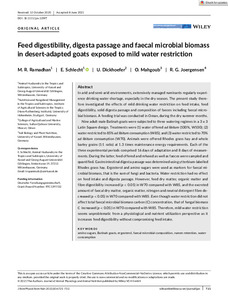| dc.date.accessioned | 2022-09-07T11:16:14Z | |
| dc.date.available | 2022-09-07T11:16:14Z | |
| dc.date.issued | 2021-07-18 | |
| dc.identifier | doi:10.17170/kobra-202207126457 | |
| dc.identifier.uri | http://hdl.handle.net/123456789/14132 | |
| dc.description.sponsorship | Gefördert im Rahmen des Projekts DEAL | ger |
| dc.language.iso | eng | eng |
| dc.rights | Attribution-NonCommercial-NoDerivatives 4.0 International | * |
| dc.rights.uri | http://creativecommons.org/licenses/by-nc-nd/4.0/ | * |
| dc.subject | amino sugars | eng |
| dc.subject | Batinah goats | eng |
| dc.subject | ergosterol | eng |
| dc.subject | faecal microbial composition | eng |
| dc.subject | rumen retention | eng |
| dc.subject | water consumption | eng |
| dc.subject.ddc | 590 | |
| dc.title | Feed digestibility, digesta passage and faecal microbial biomass in desert-adapted goats exposed to mild water restriction | eng |
| dc.type | Aufsatz | |
| dcterms.abstract | In arid and semi-arid environments, extensively managed ruminants regularly experience drinking water shortage, especially in the dry season. The present study therefore investigated the effects of mild drinking water restriction on feed intake, feed digestibility, solid digesta passage and composition of faeces including faecal microbial biomass. A feeding trial was conducted in Oman, during the dry summer months.
Nine adult male Batinah goats were subjected to three watering regimes in a 3 × 3 Latin Square design. Treatments were (1) water offered ad libitum (100%, W100); (2) water restricted to 85% ad libitum consumption (W85); and (3) water restricted to 70% ad libitum consumption (W70). Animals were offered Rhodes grass hay and whole barley grains (1:1 ratio) at 1.3 times maintenance energy requirements. Each of the three experimental periods comprised 16 days of adaptation and 8 days of measurements. During the latter, feed offered and refused as well as faeces were sampled and quantified. Gastrointestinal digesta passage was determined using ytterbium-labelled Rhodes grass hay. Ergosterol and amino sugars were used as markers for faecal microbial biomass, that is the sum of fungi and bacteria. Water restriction had no effect on feed intake and digesta passage. However, feed dry matter, organic matter and fibre digestibility increased (p < 0.05) in W70 compared with W85, and the excreted amount of faecal dry matter, organic matter, nitrogen and neutral detergent fibre decreased (p < 0.05) in W70 compared with W85. Even though water restriction did not affect total faecal microbial biomass carbon (C) concentration, that of fungal biomass C increased (p < 0.05) in W70 compared with W85. Therefore, mild water restriction seems unproblematic from a physiological and nutrient utilization perspective as it increases feed digestibility without compromising feed intake. | eng |
| dcterms.accessRights | open access | |
| dcterms.creator | Ramadhan, Mwanaima Rajab | |
| dcterms.creator | Schlecht, Eva | |
| dcterms.creator | Dickhöfer, Uta | |
| dcterms.creator | Mahgoub, Osman | |
| dcterms.creator | Jörgensen, Rainer Georg | |
| dc.relation.doi | doi:10.1111/jpn.13597 | |
| dc.subject.swd | Oman | ger |
| dc.subject.swd | Aminozucker | ger |
| dc.subject.swd | Ziege | ger |
| dc.subject.swd | Ergosterin | ger |
| dc.subject.swd | Pansen | ger |
| dc.subject.swd | Exkretion | ger |
| dc.subject.swd | Zusammensetzung | ger |
| dc.subject.swd | Wasserverbrauch | ger |
| dc.type.version | publishedVersion | |
| dcterms.source.identifier | eissn:1439-0396 | |
| dcterms.source.issue | Issue 4 | |
| dcterms.source.journal | Journal of Animal Physiology and Animal Nutrition | eng |
| dcterms.source.pageinfo | 721-732 | |
| dcterms.source.volume | Volume 106 | |
| kup.iskup | false | |


